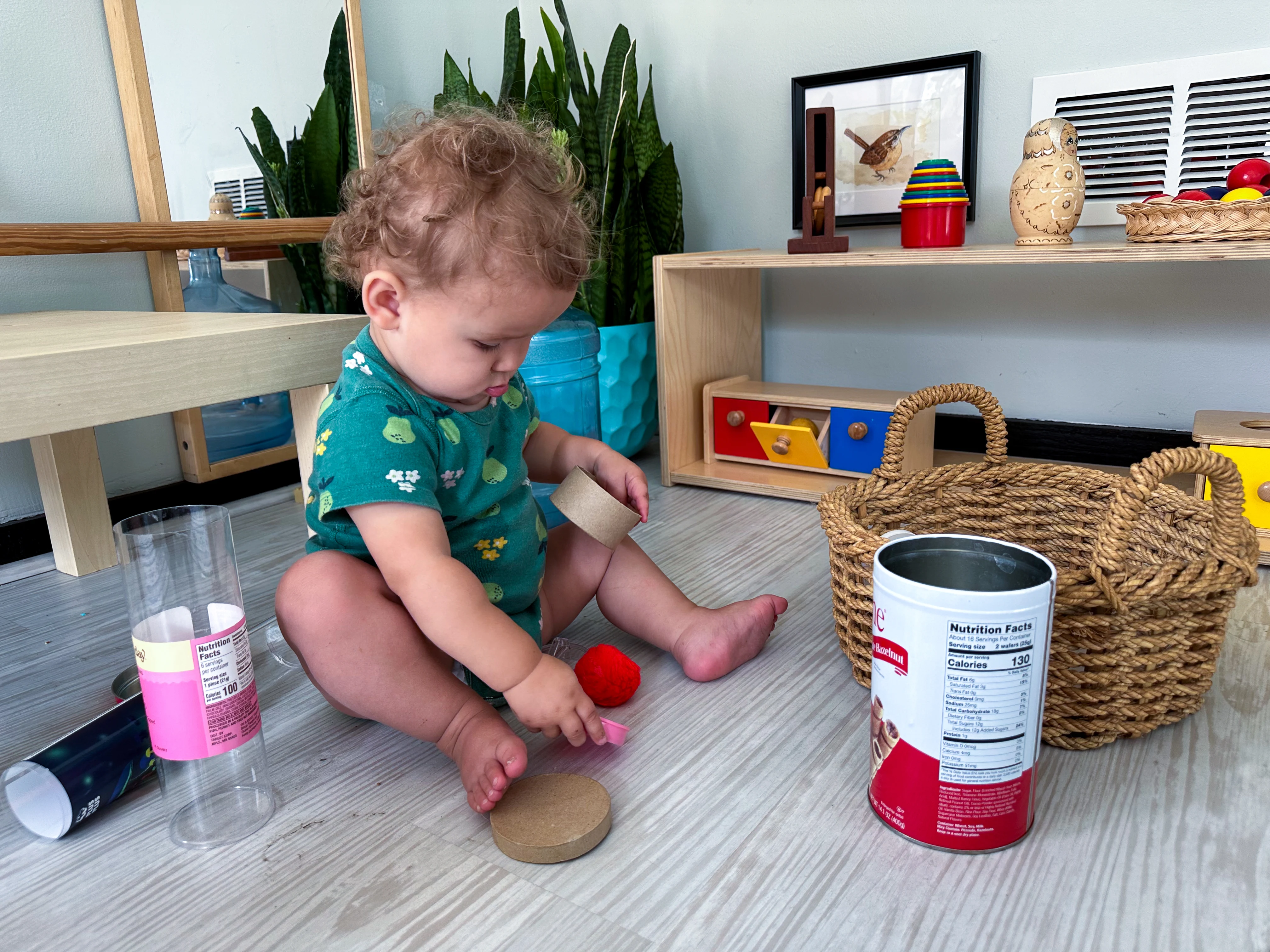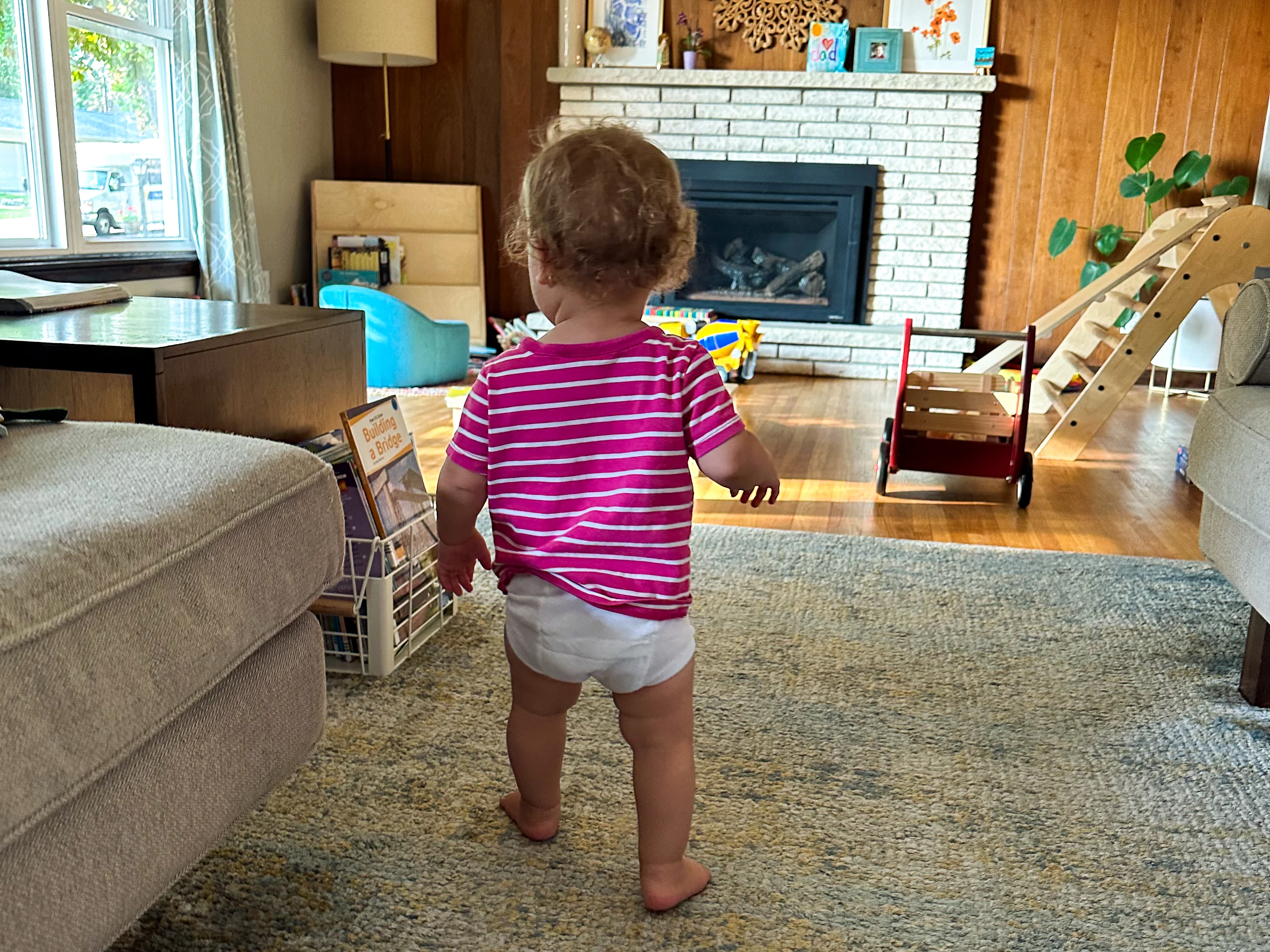Young toddlers are so fascinating to me! On their first birthday they are such babies, but even just a few short months later they are just completely different people. Then that growth just doesn't slow down. Walking, climbing, problem solving, and language skills all explode over and over again between the ages of one and two. As a Montessori parent, I know I can sit back and really enjoy these phases as they come. But, I also know that we can prepare our environment to foster the skills that our children are working on.
At 16-months, language in particular seems to be exploding for Penelope. She is starting to just talk so much. Unlike her brothers before her, her language is a lot more social "hello," "bye," "I'm thirsty," "Go outside," and a bit less of just labeling the things around her. It's really interesting watching each child's unique language development unfold and supportively standing by to communicate with them.
Creating a Language Rich Environment for Young Toddlers
As Montessori parents, the prepared environment is our most important tool! We get to make our environment the perfect place to support our child's skills, interests, and abilities. When it comes to toddlers and language there are a few ways to really create an environment that helps to support language development. Using real life images, Montessori friendly books, and practical life work we can increase the experiences and language that our children are exposed to.
Something as simple as hanging art at your toddler's level can open up a conversation opportunity. Choosing a real life image can help connect experiences they have in the world, with things that they see in their home. Books are similar. They can open up unique experiences to a toddler that they might not experience in their daily life. Choosing books that have realistic themes, beautiful images, and are simply designed can help to access new language.
Penelope is at the phase of really enjoying when we tell her the name of things in the world. She's not as much interested in a book's story, but loves to have us just point out different details and name them in the pictures. Just giving her access to our house opens up so many rich language opportunities.
But, the most important thing in your environment when it comes to language development is you! Hearing you speak with other children and adults is so important. Maria Montessori even pointed this out in the 1946 London Lectures. In several sections she talks about the importance of mothers bringing children into the adult world, letting them hear people speaking.
"It is evident that in order for children to develop language, the little child must be brought into society of adults who talk among themselves...Perhaps this is the reason why small children start out life without the ability to move; they will always need to be carried around by their mothers and therefore they are brought into the environment...You see this is a natural advantage to this immobility." Maria Montessori, 1946 London Lectures
So, how can you adjust your behavior to help foster your child's language development at 16-months? You need to have a language rich relationship with your child!
Montessori Tips for Creating a Language Rich Relationship
No matter where you are in your Montessori journey, you have a language relationship with your child. You've been talking with your baby since birth and these patterns are important. By engaging in conversations, and allowing them to express their thoughts and feelings, you establish a language-rich relationship that fosters their communication skills and supports their overall development. Here are some tips keep in mind as you create a language rich relationship with your young toddler:
- Use real, rich, actionable language: avoid baby talk or making up words. Don't be afraid to add details. So while Penelope might point and say "dog!" (which sounds like "og") I might respond with "You see a big dog! It is running so fast." or "A fluffy dog! How cute!"
- Leave space in your conversations for your child: Don't forget that babies and young children process the world at a different pace than adults, leave pauses in your conversations (sometimes longer than you think you need) for your child to respond. They may not have many words to say, but even a glance, pointing, or simple sounds can set the stage for more language later.
- Get on their level to speak with them: Let your child know you're talking with them by actually talking with them. For me this is easier with babies who aren't moving about as much, but remember it's important for toddlers too. We need to get on their level and chat with them when we have their attention.
- Incorporate sensory play, especially in nature: children learn through their senses and language is no exception. Describe sensory feelings, connect new language with sensory input. For example, "those maracas are loud!" while Penelope is shaking or playing them. This isn't necessarily sensory bins, but real, rich sensory experiences.
- Sing, rhyme, and finger plays: the motion, melody, and rhyming from music can be another great way to connect with language in the toddler years. Incorporating gestures and movements also help to make those language connections
- Real life experiences: provide engaging real life experiences - walk in the woods, take them to the grocery store, enjoy the library - all these provide so many incredible exposures to real language and new things to learn about
- Ask questions: even if your toddler can't speak or only has a few words, ask questions. Get in the habit of inviting their opinion, feelings, and thoughts into your day. "Penelope, would you like to get dressed or eat first today?" Gestures, body language, and words can all be used to gather their thoughts. But make it genuine, avoid quizzing for knowledge.
- Incorporate language into every day activities: practical life for the win! Practical every day tasks usually can include so many action words, the senses, and are just super interesting for toddlers. Invite your child as a participant in these tasks (especially caring for themselves) and narrate the process. So talk about what you're doing in diaper changes, talk about teeth brushing, getting dressed. "This shirt is so warm. Let's put it over your head! Can you lift your arms?"
These tips aren't meant to create some super talkative or language advanced children. Remember that every child is going to be on their own timeline when it comes to their development. Engaging in a language rich relationship will help be ready for your child's verbal thoughts, feelings, and interests when THEY are ready to share them. For some that might be much older, or younger than Penelope's journey.
By immersing children in a language-rich environment through activities like reading, verbalizing daily activities, and incorporating songs and rhymes, we provide them with the tools to expand their vocabulary and understanding of the world. Moreover, actively engaging in conversations, listening attentively, and asking open-ended questions fosters their communication skills and encourages them to express themselves. Use these Montessori language tools, sit back, and enjoy the pace at which your child learns!





